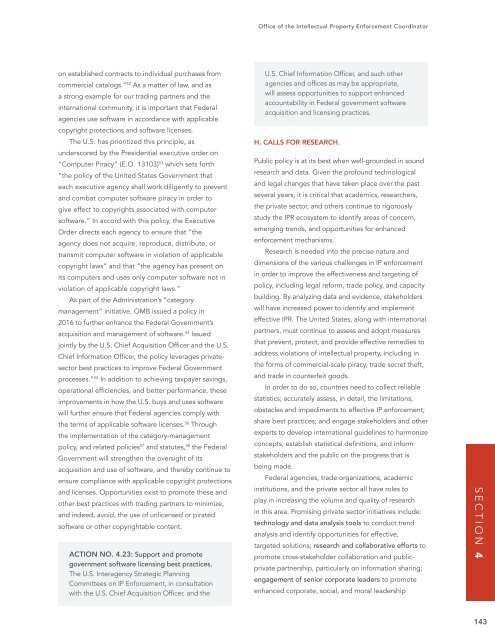ENFORCEMENT
eop_ipec_jointstrategicplan_hi-res
eop_ipec_jointstrategicplan_hi-res
You also want an ePaper? Increase the reach of your titles
YUMPU automatically turns print PDFs into web optimized ePapers that Google loves.
Office of the Intellectual Property Enforcement Coordinator<br />
on established contracts to individual purchases from<br />
commercial catalogs.” 52 As a matter of law, and as<br />
a strong example for our trading partners and the<br />
international community, it is important that Federal<br />
agencies use software in accordance with applicable<br />
copyright protections and software licenses.<br />
The U.S. has prioritized this principle, as<br />
underscored by the Presidential executive order on<br />
“Computer Piracy” (E.O. 13103) 53 which sets forth<br />
“the policy of the United States Government that<br />
each executive agency shall work diligently to prevent<br />
and combat computer software piracy in order to<br />
give effect to copyrights associated with computer<br />
software.” In accord with this policy, the Executive<br />
Order directs each agency to ensure that “the<br />
agency does not acquire, reproduce, distribute, or<br />
transmit computer software in violation of applicable<br />
copyright laws” and that “the agency has present on<br />
its computers and uses only computer software not in<br />
violation of applicable copyright laws.”<br />
As part of the Administration’s “category<br />
management” initiative, OMB issued a policy in<br />
2016 to further enhance the Federal Government’s<br />
acquisition and management of software. 54 Issued<br />
jointly by the U.S. Chief Acquisition Officer and the U.S.<br />
Chief Information Officer, the policy leverages privatesector<br />
best practices to improve Federal Government<br />
processes.” 55 In addition to achieving taxpayer savings,<br />
operational efficiencies, and better performance, these<br />
improvements in how the U.S. buys and uses software<br />
will further ensure that Federal agencies comply with<br />
the terms of applicable software licenses. 56 Through<br />
the implementation of the category-management<br />
policy, and related policies 57 and statutes, 58 the Federal<br />
Government will strengthen the oversight of its<br />
acquisition and use of software, and thereby continue to<br />
ensure compliance with applicable copyright protections<br />
and licenses. Opportunities exist to promote these and<br />
other best practices with trading partners to minimize,<br />
and indeed, avoid, the use of unlicensed or pirated<br />
software or other copyrightable content.<br />
ACTION NO. 4.23: Support and promote<br />
government software licensing best practices.<br />
The U.S. Interagency Strategic Planning<br />
Committees on IP Enforcement, in consultation<br />
with the U.S. Chief Acquisition Officer, and the<br />
U.S. Chief Information Officer, and such other<br />
agencies and offices as may be appropriate,<br />
will assess opportunities to support enhanced<br />
accountability in Federal government software<br />
acquisition and licensing practices.<br />
H. CALLS FOR RESEARCH.<br />
Public policy is at its best when well-grounded in sound<br />
research and data. Given the profound technological<br />
and legal changes that have taken place over the past<br />
several years, it is critical that academics, researchers,<br />
the private sector, and others continue to rigorously<br />
study the IPR ecosystem to identify areas of concern,<br />
emerging trends, and opportunities for enhanced<br />
enforcement mechanisms.<br />
Research is needed into the precise nature and<br />
dimensions of the various challenges in IP enforcement<br />
in order to improve the effectiveness and targeting of<br />
policy, including legal reform, trade policy, and capacity<br />
building. By analyzing data and evidence, stakeholders<br />
will have increased power to identify and implement<br />
effective IPR. The United States, along with international<br />
partners, must continue to assess and adopt measures<br />
that prevent, protect, and provide effective remedies to<br />
address violations of intellectual property, including in<br />
the forms of commercial-scale piracy, trade secret theft,<br />
and trade in counterfeit goods.<br />
In order to do so, countries need to collect reliable<br />
statistics; accurately assess, in detail, the limitations,<br />
obstacles and impediments to effective IP enforcement;<br />
share best practices; and engage stakeholders and other<br />
experts to develop international guidelines to harmonize<br />
concepts, establish statistical definitions, and inform<br />
stakeholders and the public on the progress that is<br />
being made.<br />
Federal agencies, trade organizations, academic<br />
institutions, and the private sector all have roles to<br />
play in increasing the volume and quality of research<br />
in this area. Promising private sector initiatives include:<br />
technology and data analysis tools to conduct trend<br />
analysis and identify opportunities for effective,<br />
targeted solutions; research and collaborative efforts to<br />
promote cross-stakeholder collaboration and publicprivate<br />
partnership, particularly on information sharing;<br />
engagement of senior corporate leaders to promote<br />
enhanced corporate, social, and moral leadership<br />
SECTION 4<br />
143


